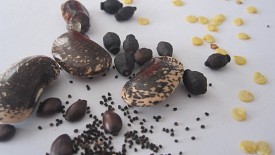Save Seeds to Save Money and Improve Your Garden
 Annuals and most vegetables have one distinct disadvanage: at the end of the season, they're gone, poof, and you have to start all over again next season or next year. That can be a real pity if you've grown fond of a specific cultivar; a tomato with an unusually delicious flavor, a lupine with a particularly beautiful color, or chard that's showy and tasty. Before you think your favorites are gone forever, consider an alternative: seed saving.
Annuals and most vegetables have one distinct disadvanage: at the end of the season, they're gone, poof, and you have to start all over again next season or next year. That can be a real pity if you've grown fond of a specific cultivar; a tomato with an unusually delicious flavor, a lupine with a particularly beautiful color, or chard that's showy and tasty. Before you think your favorites are gone forever, consider an alternative: seed saving.
Seed saving is exactly what it sounds like. Instead of eating all your crop or deadheading all your flowers, you allow some to go to seed and harvest the seeds so you can plant them next year. It's not very difficult, and you'll quickly find yourself getting the hang of it. Over time, you can start saving seeds from more and more plants, and even better than that, you can enter seed-savers' exchanges to hook up with other people who save seeds.
Such exchanges provide you with access to rare cultivars that might not be commercially available in exchange for the goodies you've reaped from your own garden. And those cultivars will be strong, with a high chance of thriving iwhere you plant them, because seed savers select for the best, the brightest, and the strongest.
What are the advantages of seed saving? Well, for one thing, you're about to save a ton of money on seeds. You'll no longer need to buy new packets every season, which can get pricey if you're an organic gardener and you're picky about the sources of your seeds. You can save up the money you're not spending on seeds to pay for cool landscaping upgrades!
For another, you're making your garden more you. Seed saving allows you to preserve the flowers and plants you love the most, and over time, you can start breeding your own preferred strains. As you get more experienced, you can play around with hybridizing various food crops and ornamentals, and you may find that you have a lot of fun and you're surprisingly good at it. Some plants hybridize readily and lend themselves really well to this activity, and the results can be both beautiful and delicious.
Additionally, you'll have more robust, healthy crops. When you seed save, you will be selecting seeds from the healthiest specimens in the garden (more about that in a minute), which means that next year, your plants will also be stronger and healthier. Over time, you can weed out genes that aren't helping your plants, and you can select plants that are more resistant to drought and other issues.
So, enough blathering: how do you seed save?
It's pretty easy. As your garden starts to mature in the late summer and early fall, keep an eye on your plants. Take note of the ones with the traits you want to preserve. This includes flowers that are particularly beautiful and robust, along with crops that have excellent yields and great flavor while also being very hardy. Be aware that you might not be able to select for every great gene in a single year -- it can take a few years to breed the perfect plant.
You can choose to let your plants go to seed on the stem, a great option for sunflowers, legumes, and other plants with large seeds that are easy to collect. Another option is to harvest wet, in the case of crops like tomatoes. If you harvest wet, rinse your seeds thoroughly (plop your fruit in a sieve) to remove as much wet plant material as possible. Then lay them out to air dry on a screen for up to two weeks until they're totally dried through.
You can even seed save from the grocery store!
Your dried seeds can be placed in an envelope and stored in a cool dry place until spring; consider hiring a handyman to build you a seed cabinet if you don't have a good storage space. Make sure to note the varietal and when they were harvested on the envelope. Next year, start a gardening log to record when and where seeds are planted, so you can track your crops. As your garden grows, you can see what's working and what's not, and you can use this information to determine which seeds you should save for the following year.
Katie Marks writes for Networx.com.
Looking for a Pro? Call us (866) 441-6648

Landscaping Average Costs
Landscapers Experiences

Lawn Repair: Contractor Followup To My DIY Prep Got The Job Done

Rock Landscaping Adds Curb Appeal To An Arizona Home



